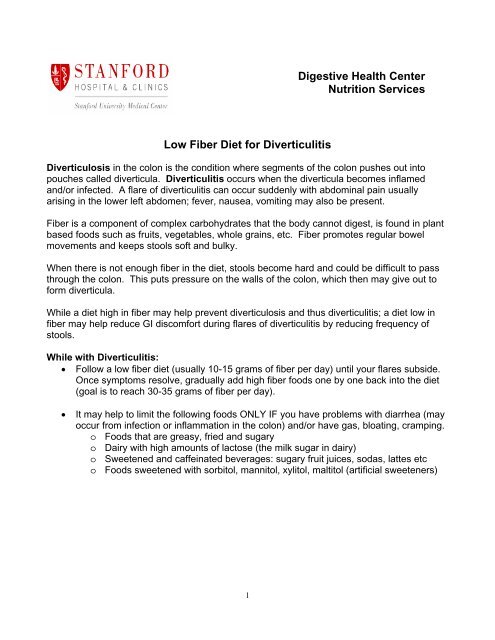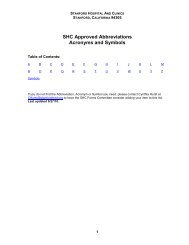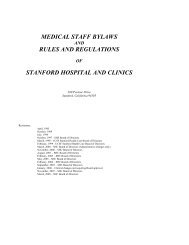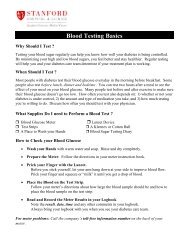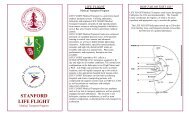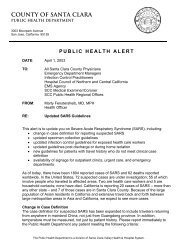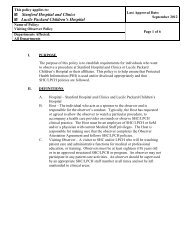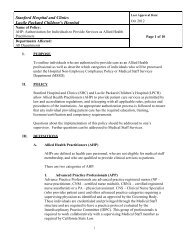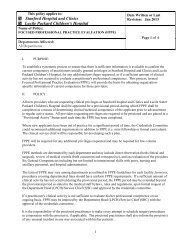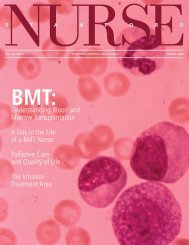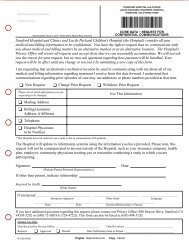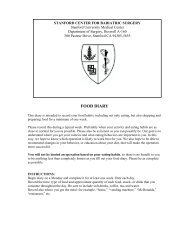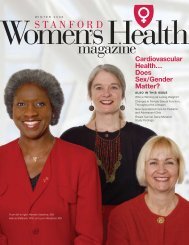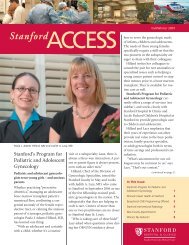Digestive Health Center Nutrition Services Low Fiber Diet - Stanford ...
Digestive Health Center Nutrition Services Low Fiber Diet - Stanford ...
Digestive Health Center Nutrition Services Low Fiber Diet - Stanford ...
You also want an ePaper? Increase the reach of your titles
YUMPU automatically turns print PDFs into web optimized ePapers that Google loves.
<strong>Low</strong> <strong>Fiber</strong> <strong>Diet</strong> for Diverticulitis<br />
1<br />
<strong>Digestive</strong> <strong>Health</strong> <strong>Center</strong><br />
<strong>Nutrition</strong> <strong>Services</strong><br />
Diverticulosis in the colon is the condition where segments of the colon pushes out into<br />
pouches called diverticula. Diverticulitis occurs when the diverticula becomes inflamed<br />
and/or infected. A flare of diverticulitis can occur suddenly with abdominal pain usually<br />
arising in the lower left abdomen; fever, nausea, vomiting may also be present.<br />
<strong>Fiber</strong> is a component of complex carbohydrates that the body cannot digest, is found in plant<br />
based foods such as fruits, vegetables, whole grains, etc. <strong>Fiber</strong> promotes regular bowel<br />
movements and keeps stools soft and bulky.<br />
When there is not enough fiber in the diet, stools become hard and could be difficult to pass<br />
through the colon. This puts pressure on the walls of the colon, which then may give out to<br />
form diverticula.<br />
While a diet high in fiber may help prevent diverticulosis and thus diverticulitis; a diet low in<br />
fiber may help reduce GI discomfort during flares of diverticulitis by reducing frequency of<br />
stools.<br />
While with Diverticulitis:<br />
Follow a low fiber diet (usually 10-15 grams of fiber per day) until your flares subside.<br />
Once symptoms resolve, gradually add high fiber foods one by one back into the diet<br />
(goal is to reach 30-35 grams of fiber per day).<br />
It may help to limit the following foods ONLY IF you have problems with diarrhea (may<br />
occur from infection or inflammation in the colon) and/or have gas, bloating, cramping.<br />
o Foods that are greasy, fried and sugary<br />
o Dairy with high amounts of lactose (the milk sugar in dairy)<br />
o Sweetened and caffeinated beverages: sugary fruit juices, sodas, lattes etc<br />
o Foods sweetened with sorbitol, mannitol, xylitol, maltitol (artificial sweeteners)
Foods for Diverticulitis<br />
Foods To Eat Foods to Limit<br />
Meats, Fish,<br />
Poultry, Eggs<br />
baked, broiled, grilled or steamed<br />
meats/poultry/fish, eggs, egg whites<br />
Dairy low lactose/lactose free dairy:<br />
(cheddar, swiss, colby, parmesan,<br />
cream cheese, lactose free milk),<br />
sour cream, low fat yogurt<br />
Meat, Dairy<br />
Alternatives<br />
almond milk, coconut milk, rice milk,<br />
rice milk ice cream, creamy nut<br />
butters, soy milk, soy cheese, soy ice<br />
cream, soy yogurt, tofu<br />
Grains eat any made with refined wheat<br />
flour, does not have dried fruit, nuts<br />
and/or seeds: bagels, breads (Italian,<br />
pita, white, sourdough), cereals<br />
(cream of wheat, cream of rice,<br />
oatmeal, cornflakes, Cheerios, Chex,<br />
Rice Krispies, etc), Saltine crackers,<br />
English muffins, graham crackers,<br />
noodles, pretzels, pastas, pancakes,<br />
flour tortilla, white rice, waffles<br />
Fruits avocado, banana, canned fruits in<br />
water, melons<br />
peeled fresh fruits (as tolerated):<br />
apple, pear, apricot, peach, plum, etc<br />
Vegetables cooked: beets, carrots, leafy greens,<br />
pumpkin, green beans, wax beans,<br />
tomato puree/sauce<br />
peeled/cooked: squash, potatoes,<br />
yams, zucchini<br />
Beverages decaffeinated coffee, sport drinks,<br />
unsweetened fruit/vegetable juices<br />
without pulp, sport drinks<br />
Desserts applesauce, angel food cake,<br />
chocolate (small amounts),<br />
marshmallows, sugar free desserts<br />
(gelatin, puddings, popsicles, etc)<br />
Seasonings,<br />
Condiments<br />
broth, butter, all spices and herbs,<br />
honey, jam/jelly, margarine,<br />
mayonnaise, mustard, salad<br />
dressings, cooking oils, salt, pepper<br />
2<br />
fried meats/poultry/fish/eggs<br />
high lactose dairy (acidophilus milk,<br />
buttermilk, cow's milk, evaporated<br />
milk, sweetened condensed milk,<br />
cream sauces, ice cream or yogurt<br />
with dried fruit, nuts and/or seeds<br />
black eyed peas, beans, lentils, nuts,<br />
crunchy butters, soybeans, split peas,<br />
fried tofu, soy/bean burger patties<br />
any grain made with whole wheat,<br />
nuts or seeds or dried fruit, multi grain<br />
breads, high fiber cereals (Kashi,<br />
<strong>Fiber</strong> One, etc), barley, bran, bulgur,<br />
croissants, sugary cereals, sweet<br />
rolls, corn tortilla, granola, brown rice,<br />
wild rice, popcorn, quinoa, rye<br />
fruit seeds/skins, fried fruits, dried<br />
fruits, fruits canned in heavy syrup,<br />
berries, cherries, dates, figs, grapes,<br />
kiwi, pineapple, prunes, oranges<br />
raw vegetables, fried vegetables,<br />
vegetable seeds/skins, artichoke,<br />
broccoli, brussel sprouts, celery,<br />
cabbage, cauliflower, corn, eggplant,<br />
green peas, lettuce, okra, tomatoes<br />
alcohol, caffeinated beverages,<br />
sugary fruit juices, fruit juices with<br />
pulp, sodas, lattes, prune juice<br />
any dessert made with coconut, dried<br />
fruit, nuts and/or seeds, brownies,<br />
cakes, candy, cookies, donuts,<br />
pastries, pies, sherbet, sorbet<br />
coconut, flax seed, maple syrup,<br />
olives, pickles, sugar, jam with seeds,<br />
all seeds, artificial sweeteners<br />
(sorbitol, mannitol, xylitol, maltitol)
Sample 1 Day Menu:<br />
Meal Food Choices<br />
Breakfast 1 scrambled egg<br />
1 slice sourdough toast with 1 teaspoon margarine<br />
½ cup cream of wheat<br />
½ cup cranberry juice<br />
Tea or coffee<br />
Snack ½ cup canned fruit cocktail (in juice)<br />
1 cup low fat milk<br />
Lunch Tuna sandwich on white bread (3 TBSP tuna salad, two slices bread)<br />
1 cup cream of chicken soup<br />
6 saltine crackers<br />
Water<br />
Tea or coffee<br />
Snack ½ cup cottage cheese<br />
1 cup cut up cantaloupe cubes<br />
Dinner<br />
Water<br />
3 oz chicken breast<br />
1 cup white rice<br />
½ cup cooked carrots<br />
1 TBSP margarine<br />
1 soft, white dinner roll<br />
Tea or coffee<br />
Approximate <strong>Nutrition</strong> Analysis:<br />
Calories: 1,670 kcal<br />
Protein: 100 grams (24% of calories)<br />
Carbohydrate: 207 grams (50% of calories)<br />
Fat: 46 grams (25% of calories)<br />
Cholesterol: 358 mg<br />
Sodium: 3,230 mg<br />
<strong>Fiber</strong>: 10 grams<br />
Resources:<br />
"<strong>Low</strong> Residue <strong>Diet</strong> in Diverticular Disease: Putting an End to a Myth"<br />
<strong>Nutrition</strong> in Clinical Practice April 2011<br />
"Diverticular Disease: Evidence for <strong>Diet</strong>ary Intervention?"<br />
<strong>Nutrition</strong> Issues in Gastroenterology (in Journal of Practical Gastroenterology) February 2007<br />
"<strong>Fiber</strong> Content of Foods" <strong>Nutrition</strong> Care Manual from the Academy of <strong>Nutrition</strong> and <strong>Diet</strong>etics<br />
Not for reproduction or publication without permission<br />
Direct inquiries to <strong>Digestive</strong> <strong>Health</strong> <strong>Center</strong> at <strong>Stanford</strong> Hospital and Clinics NS 7/2012<br />
3


